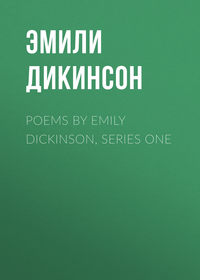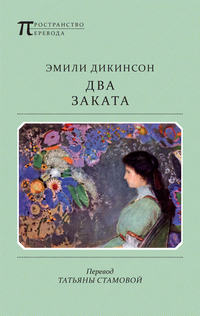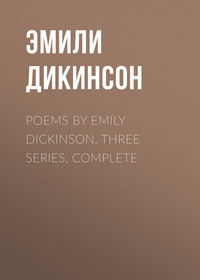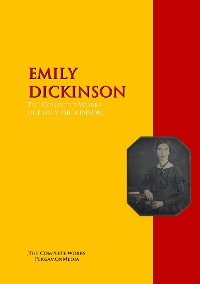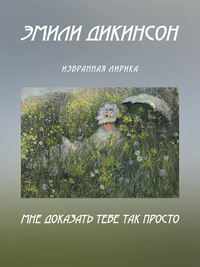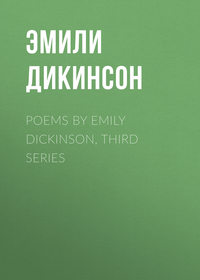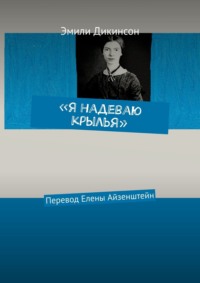Poems by Emily Dickinson, Series Two
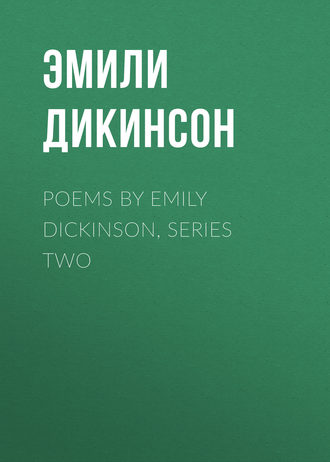 полная версия
полная версияPoems by Emily Dickinson, Series Two
Жанр: зарубежная поэзиязарубежная классиказарубежная старинная литературастихи и поэзиялитература 19 векасерьезное чтениеcтихи, поэзия
Язык: Английский
Год издания: 2018
Добавлена:
Настройки чтения
Размер шрифта
Высота строк
Поля
LII
To learn the transport by the pain,As blind men learn the sun;To die of thirst, suspectingThat brooks in meadows run;To stay the homesick, homesick feetUpon a foreign shoreHaunted by native lands, the while,And blue, beloved air —This is the sovereign anguish,This, the signal woe!These are the patient laureatesWhose voices, trained below,Ascend in ceaseless carol,Inaudible, indeed,To us, the duller scholarsOf the mysterious bard!LIII.
RETURNING
I years had been from home,And now, before the door,I dared not open, lest a faceI never saw beforeStare vacant into mineAnd ask my business there.My business, – just a life I left,Was such still dwelling there?I fumbled at my nerve,I scanned the windows near;The silence like an ocean rolled,And broke against my ear.I laughed a wooden laughThat I could fear a door,Who danger and the dead had faced,But never quaked before.I fitted to the latchMy hand, with trembling care,Lest back the awful door should spring,And leave me standing there.I moved my fingers offAs cautiously as glass,And held my ears, and like a thiefFled gasping from the house.LIV.
PRAYER
Prayer is the little implementThrough which men reachWhere presence is denied them.They fling their speechBy means of it in God's ear;If then He hear,This sums the apparatusComprised in prayer.LV
I know that he existsSomewhere, in silence.He has hid his rare lifeFrom our gross eyes.'T is an instant's play,'T is a fond ambush,Just to make blissEarn her own surprise!But should the playProve piercing earnest,Should the glee glazeIn death's stiff stare,Would not the funLook too expensive?Would not the jestHave crawled too far?LVI.
MELODIES UNHEARD
Musicians wrestle everywhere:All day, among the crowded air, I hear the silver strife;And – waking long before the dawn —Such transport breaks upon the town I think it that "new life!"It is not bird, it has no nest;Nor band, in brass and scarlet dressed, Nor tambourine, nor man;It is not hymn from pulpit read, —The morning stars the treble led On time's first afternoon!Some say it is the spheres at play!Some say that bright majority Of vanished dames and men!Some think it service in the placeWhere we, with late, celestial face, Please God, shall ascertain!LVII.
CALLED BACK
Just lost when I was saved!Just felt the world go by!Just girt me for the onset with eternity,When breath blew back,And on the other sideI heard recede the disappointed tide!Therefore, as one returned, I feel,Odd secrets of the line to tell!Some sailor, skirting foreign shores,Some pale reporter from the awful doorsBefore the seal!Next time, to stay!Next time, the things to seeBy ear unheard,Unscrutinized by eye.Next time, to tarry,While the ages steal, —Slow tramp the centuries,And the cycles wheel.II.
LOVE
I.
CHOICE
Of all the souls that stand createI have elected one.When sense from spirit files away,And subterfuge is done;When that which is and that which wasApart, intrinsic, stand,And this brief tragedy of fleshIs shifted like a sand;When figures show their royal frontAnd mists are carved away, —Behold the atom I preferredTo all the lists of clay!II
I have no life but this,To lead it here;Nor any death, but lestDispelled from there;Nor tie to earths to come,Nor action new,Except through this extent,The realm of you.III
Your riches taught me poverty.Myself a millionnaireIn little wealths, – as girls could boast, —Till broad as Buenos Ayre,You drifted your dominionsA different Peru;And I esteemed all poverty,For life's estate with you.Of mines I little know, myself,But just the names of gems, —The colors of the commonest;And scarce of diademsSo much that, did I meet the queen,Her glory I should know:But this must be a different wealth,To miss it beggars so.I 'm sure 't is India all dayTo those who look on youWithout a stint, without a blame, —Might I but be the Jew!I 'm sure it is Golconda,Beyond my power to deem, —To have a smile for mine each day,How better than a gem!At least, it solaces to knowThat there exists a gold,Although I prove it just in timeIts distance to behold!It 's far, far treasure to surmise,And estimate the pearlThat slipped my simple fingers throughWhile just a girl at school!IV.
THE CONTRACT
I gave myself to him,And took himself for pay.The solemn contract of a lifeWas ratified this way.The wealth might disappoint,Myself a poorer proveThan this great purchaser suspect,The daily own of LoveDepreciate the vision;But, till the merchant buy,Still fable, in the isles of spice,The subtle cargoes lie.At least, 't is mutual risk, —Some found it mutual gain;Sweet debt of Life, – each night to owe,Insolvent, every noon.V.
THE LETTER
"GOING to him! Happy letter! Tell him —Tell him the page I did n't write;Tell him I only said the syntax,And left the verb and the pronoun out.Tell him just how the fingers hurried,Then how they waded, slow, slow, slow;And then you wished you had eyes in your pages,So you could see what moved them so."Tell him it was n't a practised writer,You guessed, from the way the sentence toiled;You could hear the bodice tug, behind you,As if it held but the might of a child;You almost pitied it, you, it worked so.Tell him – No, you may quibble there,For it would split his heart to know it,And then you and I were silenter."Tell him night finished before we finished,And the old clock kept neighing 'day!'And you got sleepy and begged to be ended —What could it hinder so, to say?Tell him just how she sealed you, cautious,But if he ask where you are hidUntil to-morrow, – happy letter!Gesture, coquette, and shake your head!"VI
The way I read a letter 's this:'T is first I lock the door,And push it with my fingers next,For transport it be sure.And then I go the furthest offTo counteract a knock;Then draw my little letter forthAnd softly pick its lock.Then, glancing narrow at the wall,And narrow at the floor,For firm conviction of a mouseNot exorcised before,Peruse how infinite I amTo – no one that you know!And sigh for lack of heaven, – but notThe heaven the creeds bestow.VII
Wild nights! Wild nights!Were I with thee,Wild nights should beOur luxury!Futile the windsTo a heart in port, —Done with the compass,Done with the chart.Rowing in Eden!Ah! the sea!Might I but moorTo-night in thee!VIII.
AT HOME
The night was wide, and furnished scantWith but a single star,That often as a cloud it metBlew out itself for fear.The wind pursued the little bush,And drove away the leavesNovember left; then clambered upAnd fretted in the eaves.No squirrel went abroad;A dog's belated feetLike intermittent plush were heardAdown the empty street.To feel if blinds be fast,And closer to the fireHer little rocking-chair to draw,And shiver for the poor,The housewife's gentle task."How pleasanter," said sheUnto the sofa opposite,"The sleet than May – no thee!"IX.
POSSESSION
Did the harebell loose her girdleTo the lover bee,Would the bee the harebell hallowMuch as formerly?Did the paradise, persuaded,Yield her moat of pearl,Would the Eden be an Eden,Or the earl an earl?X
A charm invests a faceImperfectly beheld, —The lady dare not lift her veilFor fear it be dispelled.But peers beyond her mesh,And wishes, and denies, —Lest interview annul a wantThat image satisfies.XI.
THE LOVERS
The rose did caper on her cheek,Her bodice rose and fell,Her pretty speech, like drunken men,Did stagger pitiful.Her fingers fumbled at her work, —Her needle would not go;What ailed so smart a little maidIt puzzled me to know,Till opposite I spied a cheekThat bore another rose;Just opposite, another speechThat like the drunkard goes;A vest that, like the bodice, dancedTo the immortal tune, —Till those two troubled little clocksTicked softly into one.XII
In lands I never saw, they say,Immortal Alps look down,Whose bonnets touch the firmament,Whose sandals touch the town, —Meek at whose everlasting feetA myriad daisies play.Which, sir, are you, and which am I,Upon an August day?XIII
The moon is distant from the sea,And yet with amber handsShe leads him, docile as a boy,Along appointed sands.He never misses a degree;Obedient to her eye,He comes just so far toward the town,Just so far goes away.Oh, Signor, thine the amber hand,And mine the distant sea, —Obedient to the least commandThine eyes impose on me.XIV
He put the belt around my life, —I heard the buckle snap,And turned away, imperial,My lifetime folding upDeliberate, as a duke would doA kingdom's title-deed, —Henceforth a dedicated sort,A member of the cloud.Yet not too far to come at call,And do the little toilsThat make the circuit of the rest,And deal occasional smilesTo lives that stoop to notice mineAnd kindly ask it in, —Whose invitation, knew you notFor whom I must decline?XV.
THE LOST JEWEL
I held a jewel in my fingersAnd went to sleep.The day was warm, and winds were prosy;I said: "'T will keep."I woke and chid my honest fingers, —The gem was gone;And now an amethyst remembranceIs all I own.XVI
What if I say I shall not wait?What if I burst the fleshly gateAnd pass, escaped, to thee?What if I file this mortal off,See where it hurt me, – that 's enough, —And wade in liberty?They cannot take us any more, —Dungeons may call, and guns implore;Unmeaning now, to me,As laughter was an hour ago,Or laces, or a travelling show,Or who died yesterday!III.
NATURE
I.
MOTHER NATURE
Nature, the gentlest mother,Impatient of no child,The feeblest or the waywardest, —Her admonition mildIn forest and the hillBy traveller is heard,Restraining rampant squirrelOr too impetuous bird.How fair her conversation,A summer afternoon, —Her household, her assembly;And when the sun goes downHer voice among the aislesIncites the timid prayerOf the minutest cricket,The most unworthy flower.When all the children sleepShe turns as long awayAs will suffice to light her lamps;Then, bending from the skyWith infinite affectionAnd infiniter care,Her golden finger on her lip,Wills silence everywhere.II.
OUT OF THE MORNING
Will there really be a morning?Is there such a thing as day?Could I see it from the mountainsIf I were as tall as they?Has it feet like water-lilies?Has it feathers like a bird?Is it brought from famous countriesOf which I have never heard?Oh, some scholar! Oh, some sailor!Oh, some wise man from the skies!Please to tell a little pilgrimWhere the place called morning lies!III
At half-past three a single birdUnto a silent skyPropounded but a single termOf cautious melody.At half-past four, experimentHad subjugated test,And lo! her silver principleSupplanted all the rest.At half-past seven, elementNor implement was seen,And place was where the presence was,Circumference between.IV.
DAY'S PARLOR
The day came slow, till five o'clock,Then sprang before the hillsLike hindered rubies, or the lightA sudden musket spills.The purple could not keep the east,The sunrise shook from fold,Like breadths of topaz, packed a night,The lady just unrolled.The happy winds their timbrels took;The birds, in docile rows,Arranged themselves around their prince(The wind is prince of those).The orchard sparkled like a Jew, —How mighty 't was, to stayA guest in this stupendous place,The parlor of the day!V.
THE SUN'S WOOING
The sun just touched the morning;The morning, happy thing,Supposed that he had come to dwell,And life would be all spring.She felt herself supremer, —A raised, ethereal thing;Henceforth for her what holiday!Meanwhile, her wheeling kingTrailed slow along the orchardsHis haughty, spangled hems,Leaving a new necessity, —The want of diadems!The morning fluttered, staggered,Felt feebly for her crown, —Her unanointed foreheadHenceforth her only one.VI.
THE ROBIN
The robin is the oneThat interrupts the mornWith hurried, few, express reportsWhen March is scarcely on.The robin is the oneThat overflows the noonWith her cherubic quantity,An April but begun.The robin is the oneThat speechless from her nestSubmits that home and certaintyAnd sanctity are best.VII.
THE BUTTERFLY'S DAY
From cocoon forth a butterflyAs lady from her doorEmerged – a summer afternoon —Repairing everywhere,Without design, that I could trace,Except to stray abroadOn miscellaneous enterpriseThe clovers understood.Her pretty parasol was seenContracting in a fieldWhere men made hay, then struggling hardWith an opposing cloud,Where parties, phantom as herself,To Nowhere seemed to goIn purposeless circumference,As 't were a tropic show.And notwithstanding bee that worked,And flower that zealous blew,This audience of idlenessDisdained them, from the sky,Till sundown crept, a steady tide,And men that made the hay,And afternoon, and butterfly,Extinguished in its sea.VIII.
THE BLUEBIRD
Before you thought of spring,Except as a surmise,You see, God bless his suddenness,A fellow in the skiesOf independent hues,A little weather-worn,Inspiriting habilimentsOf indigo and brown.With specimens of song,As if for you to choose,Discretion in the interval,With gay delays he goesTo some superior treeWithout a single leaf,And shouts for joy to nobodyBut his seraphic self!IX.
APRIL
An altered look about the hills;A Tyrian light the village fills;A wider sunrise in the dawn;A deeper twilight on the lawn;A print of a vermilion foot;A purple finger on the slope;A flippant fly upon the pane;A spider at his trade again;An added strut in chanticleer;A flower expected everywhere;An axe shrill singing in the woods;Fern-odors on untravelled roads, —All this, and more I cannot tell,A furtive look you know as well,And Nicodemus' mysteryReceives its annual reply.X.
THE SLEEPING FLOWERS
"Whose are the little beds," I asked,"Which in the valleys lie?"Some shook their heads, and others smiled,And no one made reply."Perhaps they did not hear," I said;"I will inquire again.Whose are the beds, the tiny bedsSo thick upon the plain?""'T is daisy in the shortest;A little farther on,Nearest the door to wake the first,Little leontodon."'T is iris, sir, and aster,Anemone and bell,Batschia in the blanket red,And chubby daffodil."Meanwhile at many cradlesHer busy foot she plied,Humming the quaintest lullabyThat ever rocked a child."Hush! Epigea wakens! —The crocus stirs her lids,Rhodora's cheek is crimson, —She's dreaming of the woods."Then, turning from them, reverent,"Their bed-time 't is," she said;"The bumble-bees will wake themWhen April woods are red."XI.
MY ROSE
Pigmy seraphs gone astray,Velvet people from Vevay,Belles from some lost summer day,Bees' exclusive coterie.Paris could not lay the foldBelted down with emerald;Venice could not show a cheekOf a tint so lustrous meek.Never such an ambuscadeAs of brier and leaf displayedFor my little damask maid.I had rather wear her graceThan an earl's distinguished face;I had rather dwell like herThan be Duke of ExeterRoyalty enough for meTo subdue the bumble-bee!XII.
THE ORIOLE'S SECRET
To hear an oriole singMay be a common thing,Or only a divine.It is not of the birdWho sings the same, unheard,As unto crowd.The fashion of the earAttireth that it hearIn dun or fair.So whether it be rune,Or whether it be none,Is of within;The "tune is in the tree,"The sceptic showeth me;"No, sir! In thee!"XIII.
THE ORIOLE
One of the ones that Midas touched,Who failed to touch us all,Was that confiding prodigal,The blissful oriole.So drunk, he disavows itWith badinage divine;So dazzling, we mistake himFor an alighting mine.A pleader, a dissembler,An epicure, a thief, —Betimes an oratorio,An ecstasy in chief;The Jesuit of orchards,He cheats as he enchantsOf an entire attarFor his decamping wants.The splendor of a Burmah,The meteor of birds,Departing like a pageantOf ballads and of bards.I never thought that Jason soughtFor any golden fleece;But then I am a rural man,With thoughts that make for peace.But if there were a Jason,Tradition suffer meBehold his lost emolumentUpon the apple-tree.XIV.
IN SHADOW
I dreaded that first robin so,But he is mastered now,And I 'm accustomed to him grown, —He hurts a little, though.I thought if I could only liveTill that first shout got by,Not all pianos in the woodsHad power to mangle me.I dared not meet the daffodils,For fear their yellow gownWould pierce me with a fashionSo foreign to my own.I wished the grass would hurry,So when 't was time to see,He 'd be too tall, the tallest oneCould stretch to look at me.I could not bear the bees should come,I wished they 'd stay awayIn those dim countries where they go:What word had they for me?They 're here, though; not a creature failed,No blossom stayed awayIn gentle deference to me,The Queen of Calvary.Each one salutes me as he goes,And I my childish plumesLift, in bereaved acknowledgmentOf their unthinking drums.XV.
THE HUMMING-BIRD
A route of evanescenceWith a revolving wheel;A resonance of emerald,A rush of cochineal;And every blossom on the bushAdjusts its tumbled head, —The mail from Tunis, probably,An easy morning's ride.XVI.
SECRETS
The skies can't keep their secret!They tell it to the hills —The hills just tell the orchards —And they the daffodils!A bird, by chance, that goes that waySoft overheard the whole.If I should bribe the little bird,Who knows but she would tell?I think I won't, however,It's finer not to know;If summer were an axiom,What sorcery had snow?So keep your secret, Father!I would not, if I could,Know what the sapphire fellows do,In your new-fashioned world!XVII
Who robbed the woods,The trusting woods?The unsuspecting treesBrought out their burrs and mossesHis fantasy to please.He scanned their trinkets, curious,He grasped, he bore away.What will the solemn hemlock,What will the fir-tree say?XVIII.
TWO VOYAGERS
Two butterflies went out at noonAnd waltzed above a stream,Then stepped straight through the firmamentAnd rested on a beam;And then together bore awayUpon a shining sea, —Though never yet, in any port,Their coming mentioned be.If spoken by the distant bird,If met in ether seaBy frigate or by merchantman,Report was not to me.XIX.
BY THE SEA
I started early, took my dog,And visited the sea;The mermaids in the basementCame out to look at me,And frigates in the upper floorExtended hempen hands,Presuming me to be a mouseAground, upon the sands.But no man moved me till the tideWent past my simple shoe,And past my apron and my belt,And past my bodice too,And made as he would eat me upAs wholly as a dewUpon a dandelion's sleeve —And then I started too.And he – he followed close behind;I felt his silver heelUpon my ankle, – then my shoesWould overflow with pearl.Until we met the solid town,No man he seemed to know;And bowing with a mighty lookAt me, the sea withdrew.XX.
OLD-FASHIONED
Arcturus is his other name, —I'd rather call him star!It's so unkind of scienceTo go and interfere!I pull a flower from the woods, —A monster with a glassComputes the stamens in a breath,And has her in a class.Whereas I took the butterflyAforetime in my hat,He sits erect in cabinets,The clover-bells forgot.What once was heaven, is zenith now.Where I proposed to goWhen time's brief masquerade was done,Is mapped, and charted too!What if the poles should frisk aboutAnd stand upon their heads!I hope I 'm ready for the worst,Whatever prank betides!Perhaps the kingdom of Heaven 's changed!I hope the children thereWon't be new-fashioned when I come,And laugh at me, and stare!I hope the father in the skiesWill lift his little girl, —Old-fashioned, naughty, everything, —Over the stile of pearl!XXI.
A TEMPEST
An awful tempest mashed the air,The clouds were gaunt and few;A black, as of a spectre's cloak,Hid heaven and earth from view.The creatures chuckled on the roofsAnd whistled in the air,And shook their fists and gnashed their teeth.And swung their frenzied hair.The morning lit, the birds arose;The monster's faded eyesTurned slowly to his native coast,And peace was Paradise!XXII.
THE SEA
An everywhere of silver,With ropes of sandTo keep it from effacingThe track called land.XXIII.
IN THE GARDEN
A bird came down the walk:He did not know I saw;He bit an angle-worm in halvesAnd ate the fellow, raw.And then he drank a dewFrom a convenient grass,And then hopped sidewise to the wallTo let a beetle pass.He glanced with rapid eyesThat hurried all abroad, —They looked like frightened beads, I thought;He stirred his velvet headLike one in danger; cautious,I offered him a crumb,And he unrolled his feathersAnd rowed him softer homeThan oars divide the ocean,Too silver for a seam,Or butterflies, off banks of noon,Leap, plashless, as they swim.XXIV.
THE SNAKE
A narrow fellow in the grassOccasionally rides;You may have met him, – did you not,His notice sudden is.The grass divides as with a comb,A spotted shaft is seen;And then it closes at your feetAnd opens further on.He likes a boggy acre,A floor too cool for corn.Yet when a child, and barefoot,I more than once, at morn,Have passed, I thought, a whip-lashUnbraiding in the sun, —When, stooping to secure it,It wrinkled, and was gone.Several of nature's peopleI know, and they know me;I feel for them a transportOf cordiality;But never met this fellow,Attended or alone,Without a tighter breathing,And zero at the bone.XXV.
THE MUSHROOM
The mushroom is the elf of plants,At evening it is not;At morning in a truffled hutIt stops upon a spotAs if it tarried always;And yet its whole careerIs shorter than a snake's delay,And fleeter than a tare.'T is vegetation's juggler,The germ of alibi;Doth like a bubble antedate,And like a bubble hie.I feel as if the grass were pleasedTo have it intermit;The surreptitious scionOf summer's circumspect.Had nature any outcast face,Could she a son contemn,Had nature an Iscariot,That mushroom, – it is him.XXVI.
THE STORM
There came a wind like a bugle;It quivered through the grass,And a green chill upon the heatSo ominous did passWe barred the windows and the doorsAs from an emerald ghost;The doom's electric moccasonThat very instant passed.On a strange mob of panting trees,And fences fled away,And rivers where the houses ranThe living looked that day.The bell within the steeple wildThe flying tidings whirled.How much can comeAnd much can go,And yet abide the world!XXVII.
THE SPIDER
A spider sewed at nightWithout a lightUpon an arc of white.If ruff it was of dameOr shroud of gnome,Himself, himself inform.Of immortalityHis strategyWas physiognomy.XXVIII
I know a place where summer strivesWith such a practised frost,She each year leads her daisies back,Recording briefly, "Lost."But when the south wind stirs the poolsAnd struggles in the lanes,Her heart misgives her for her vow,And she pours soft refrainsInto the lap of adamant,And spices, and the dew,That stiffens quietly to quartz,Upon her amber shoe.XXIX
The one that could repeat the summer dayWere greater than itself, though heMinutest of mankind might be.And who could reproduce the sun,At period of going down —The lingering and the stain, I mean —When Orient has been outgrown,And Occident becomes unknown,His name remain.XXX.
THE WlND'S VISIT
The wind tapped like a tired man,And like a host, "Come in,"I boldly answered; entered thenMy residence withinA rapid, footless guest,To offer whom a chairWere as impossible as handA sofa to the air.No bone had he to bind him,His speech was like the pushOf numerous humming-birds at onceFrom a superior bush.His countenance a billow,His fingers, if he pass,Let go a music, as of tunesBlown tremulous in glass.He visited, still flitting;Then, like a timid man,Again he tapped – 't was flurriedly —And I became alone.

